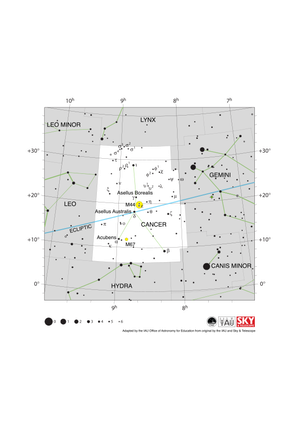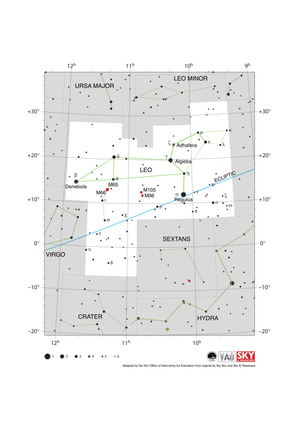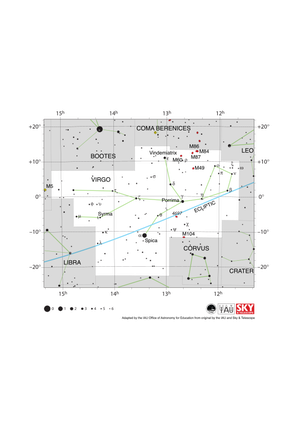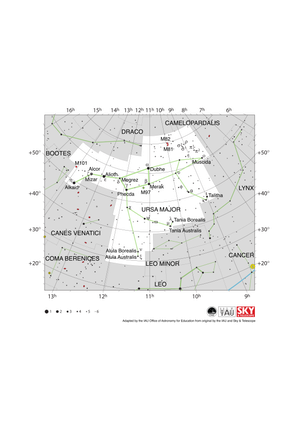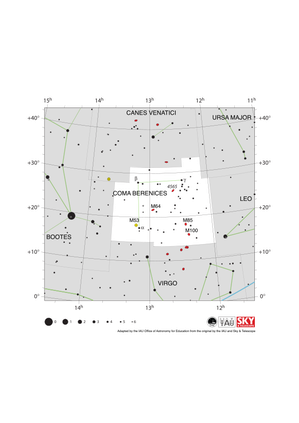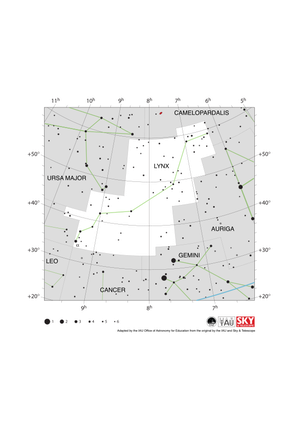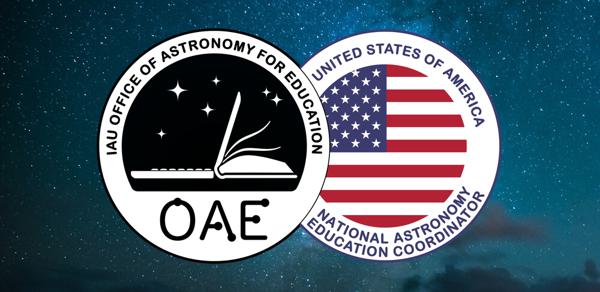Glossary term: 狮子座
Description: 狮子座是黄道带上的一个星座,也就是说,组成这个星座的恒星位于与黄道(由地球绕太阳运行的轨迹所确定的平面)相交的那部分天空。因此,从地球上看,我们会发现太阳和行星经常落在狮子座中。就太阳而言,这发生在每年8月11日到9月17日之间。(当然,要是太阳位于狮子座,我们就看不到狮子座中的恒星了。)狮子座在春季夜空中最容易观测到。狮子座是国际天文学联合会定义的88个现代星座之一,也是公元2世纪的天文学家克罗狄斯·托勒密(Claudius Ptolemy)命名的48个古典星座之一。狮子座众多亮星中,最亮的一颗叫做轩辕十四。
Related Terms:
See this term in other languages
Term and definition status: The original definition of this term in English have been approved by a research astronomer and a teacher The translation of this term and its definition is still awaiting approval
The OAE Multilingual Glossary is a project of the IAU Office of Astronomy for Education (OAE) in collaboration with the IAU Office of Astronomy Outreach (OAO). The terms and definitions were chosen, written and reviewed by a collective effort from the OAE, the OAE Centers and Nodes, the OAE National Astronomy Education Coordinators (NAECs) and other volunteers. You can find a full list of credits here. All glossary terms and their definitions are released under a Creative Commons CC BY-4.0 license and should be credited to "IAU OAE".
If you notice a factual or translation error in this glossary term or definition then please get in touch.
Related Diagrams
Cancer Constellation Map
Credit: Adapted by the IAU Office of Astronomy for Education from the original by IAU/Sky & Telescope
License: CC-BY-4.0 Creative Commons 署名 4.0 国际 (CC BY 4.0) icons
Leo Constellation Map
Credit: Adapted by the IAU Office of Astronomy for Education from the original by IAU/Sky & Telescope
License: CC-BY-4.0 Creative Commons 署名 4.0 国际 (CC BY 4.0) icons
Virgo Constellation Map
Credit: Adapted by the IAU Office of Astronomy for Education from the original by IAU/Sky & Telescope
License: CC-BY-4.0 Creative Commons 署名 4.0 国际 (CC BY 4.0) icons
Ursa Major Constellation Map
Credit: Adapted by the IAU Office of Astronomy for Education from the original by IAU/Sky & Telescope
License: CC-BY-4.0 Creative Commons 署名 4.0 国际 (CC BY 4.0) icons
Coma Berenices Constellation Map
Credit: Adapted by the IAU Office of Astronomy for Education from the original by the IAU and Sky & Telescope
License: CC-BY-4.0 Creative Commons 署名 4.0 国际 (CC BY 4.0) icons
Leo Minor Constellation Map
Credit: Adapted by the IAU Office of Astronomy for Education from the original by the IAU and Sky & Telescope
License: CC-BY-4.0 Creative Commons 署名 4.0 国际 (CC BY 4.0) icons
Lynx Constellation Map
Credit: Adapted by the IAU Office of Astronomy for Education from the original by the IAU and Sky & Telescope
License: CC-BY-4.0 Creative Commons 署名 4.0 国际 (CC BY 4.0) icons
Sextans Constellation Map
Credit: Adapted by the IAU Office of Astronomy for Education from the original by the IAU and Sky & Telescope
License: CC-BY-4.0 Creative Commons 署名 4.0 国际 (CC BY 4.0) icons
